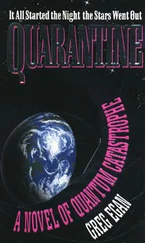‘The time passed quickly,’ she said. ‘After the first year.’
‘I can’t say the same, though maybe with the ratios it almost evens out.’ He buzzed suddenly. ‘Cira told me about your big discovery. The ancestors don’t burn, we don’t wipe ourselves out – what could be better than that?’
‘People acting on it,’ Agata replied. ‘I thought I’d come back to find that everyone had buried their differences.’
‘Not yet.’
Agata didn’t want to start interrogating him about his views on the disruption, but it would seem strange if they didn’t discuss it at all. ‘Do you think the Councillors are going to pull the plug?’
‘Why would they do that?’
‘They’ve seen the problems that the system’s created,’ she said. ‘We can’t spend the next six generations stuck with the same technology.’
‘But how would they explain the shutdown afterwards, without admitting that they’d planned it all along?’ Pio wondered.
‘They could claim that there’d been some kind of minor impact,’ Agata suggested. ‘With just the right size and trajectory to take out all twelve channels at once, but do no real damage elsewhere.’
‘All of which they’d more or less guessed, of course. But lacking proof, they couldn’t announce it officially.’ Pio inclined his head. ‘It’s possible, I suppose. We’ll know soon enough.’
‘Yes.’
Pio changed the subject. ‘Are you going to see Cira?’
‘I don’t think so.’ Agata supposed it might sound suspicious that she was prepared to reconcile with Pio but not her mother. But she wasn’t a good enough actor to pull off that encounter, and Cira would have much less motivation to play along. ‘If she’s stood by you, that’s admirable, but I think she and I reached the point a long time ago where we’ll be happier if we stay out of each other’s way.’
‘I understand.’
‘Can I bring you anything?’ she asked. ‘They let you have books, don’t they?’
‘I can always use more paper and dye,’ Pio said. ‘I’m writing a book of my own.’
‘What kind of book?’ Agata couldn’t help mocking him a little. ‘Surely there’s no need for a migrationist manifesto now?’
‘It’s a history of women and men,’ he replied.
‘You mean the discovery of shedding – that kind of thing?’
‘More or less. You can read it when it’s finished, if you like.’
Agata couldn’t imagine what he thought he could add to the version in the archives, but if he had a project to help him pass the time that could only be a good thing.
When the guard returned to fetch him, Pio leant across the desk and executed an awkward hug. As he drew back, Agata was still trying to memorise the sensation of his palm on her shoulder.
‘Will I see you again?’ he asked.
‘Of course,’ she replied. The guard looked amused; apparently not in the next five stints.
Agata sat at the desk for a while, self-consciously pensive, her palms resting on her thighs as she passed copies of Pio’s tightly scrawled instructions back and forth between the two hidden patches of skin.
The food hall was close to the rim of the Peerless , and even at the second bell it was crowded. Agata entered and queued at the counter, trying to remain unfazed as she noticed people looking her way twice, probably recognising her from the archival image of the Surveyor ’s return. At least their faces showed a flicker of surprise, proving that they wouldn’t make so much of the encounter that they let themselves know about it in advance.
She’d barely slept the night before, and then as she’d prepared to leave her apartment her console had beeped and offered up a message from her future self:
I still don’t agree.
It would be sent three stints before the disruption; that didn’t quite prove that she’d be walking free right to the end, but it was more reassuring than absolute silence. And if the meaning was opaque to her at present, she could only hope that anyone spying on her would find the lack of context unremarkable. There was no reason for anyone’s private messages to spell out every detail of the dilemmas they were intended to resolve. The bandwidth quotas weren’t infinite: gnomic brevity would generally be a virtue, not a sign that the sender had something to hide.
When her turn came at the counter she asked for two plain loaves; she’d discovered after the welcoming party that her gut no longer appreciated fresh spices. She carried the food to the corner farthest from the entrance, where an awkwardly placed cooling vent discouraged most diners. The present crowd left few enough alternatives for her choice not to seem too perverse.
She sat on the floor and ate slowly, her front eyes on her food, her rear gaze to the wall.
She was halfway through the second loaf when a man addressed her. ‘Did you drop these?’ Agata looked up. There were three coins on his outstretched palm; she squinted at them, memorised their value, then said, ‘No, they’re not mine.’
‘Sorry to have troubled you.’
Pio hadn’t told her how long she should wait, so as soon as she’d finished eating she left the hall and headed for the address indexed by the coins’ denominations. The area wasn’t familiar to her, but as she ascended the stairs towards the axis and then dragged herself along the corridor towards her destination, the smooth texture of the rock beneath her feet and the red tunnel of the moss-lit walls were enough to induce an ache of recognition. The death of every traveller save a handful of evacuees was beyond her power to imagine, but she’d come as close as anyone alive to feeling the absence of the mountain itself. If she needed a vision of the loss she was fighting to prevent, she could think of the Peerless retreating into the distance, shrinking to a dark speck against the stars and then vanishing.
Outside the door, she hesitated, but she’d have to trust Pio’s comrades to have chosen an appropriate level of precautions, and the innovation block to have kept the Council from automatically tracking everyone, everywhere. She knocked firmly, and after a few pauses the door swung open and a man invited her into the apartment.
‘My name’s Giacomo,’ he said.
‘I’m Agata.’ She closed the door behind her. ‘Can we talk freely?’
‘Absolutely,’ Giacomo assured her.
There was no point in prevaricating. ‘I want to help shut down the messaging system,’ she said. ‘We have a dozen and six small machines out on the slopes, capable of moving along the rock and flying for short distances. If you can tell us exactly where to send them, we can use them to occult the orthogonal stars for all of the channels.’
Giacomo hesitated before replying, but only as much as politeness required. He must have had years to consider her offer.
‘The system uses light from the entire orthogonal cluster,’ he said. ‘It’s not a matter of one star per channel. To shut it down, you’d need to blot out half the sky from twelve different vantage points.’
‘The entire cluster?’ Agata had always pictured a single star as the light source. When Medoro had first raised the idea with her, he’d started with a thought experiment where a distant object passed in front of a time-reversed star – and if the object had to be remote enough for the time the light spent in transit to be significant, it could hardly block out anything larger. But once you folded up the light path with mirrors, the same constraints no longer applied.
‘The optics gathers light from all directions visible from the base of the mountain,’ Giacomo explained. ‘Or sends it out, if you want to talk in terms of our arrow, but it’s easier for me to imagine the whole thing working backwards. All that each channel needs is a reliable light source that it can block or reveal with a shutter. Combining all the light from across the cluster makes the source brighter and more dependable.’
Читать дальше










